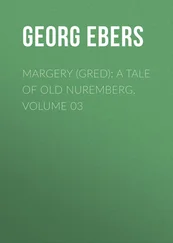Georg Ebers - Margery (Gred) - A Tale Of Old Nuremberg. Complete
Здесь есть возможность читать онлайн «Georg Ebers - Margery (Gred) - A Tale Of Old Nuremberg. Complete» — ознакомительный отрывок электронной книги совершенно бесплатно, а после прочтения отрывка купить полную версию. В некоторых случаях можно слушать аудио, скачать через торрент в формате fb2 и присутствует краткое содержание. Жанр: foreign_prose, literature_19, foreign_antique, на английском языке. Описание произведения, (предисловие) а так же отзывы посетителей доступны на портале библиотеки ЛибКат.
- Название:Margery (Gred): A Tale Of Old Nuremberg. Complete
- Автор:
- Жанр:
- Год:неизвестен
- ISBN:нет данных
- Рейтинг книги:3 / 5. Голосов: 1
-
Избранное:Добавить в избранное
- Отзывы:
-
Ваша оценка:
- 60
- 1
- 2
- 3
- 4
- 5
Margery (Gred): A Tale Of Old Nuremberg. Complete: краткое содержание, описание и аннотация
Предлагаем к чтению аннотацию, описание, краткое содержание или предисловие (зависит от того, что написал сам автор книги «Margery (Gred): A Tale Of Old Nuremberg. Complete»). Если вы не нашли необходимую информацию о книге — напишите в комментариях, мы постараемся отыскать её.
Margery (Gred): A Tale Of Old Nuremberg. Complete — читать онлайн ознакомительный отрывок
Ниже представлен текст книги, разбитый по страницам. Система сохранения места последней прочитанной страницы, позволяет с удобством читать онлайн бесплатно книгу «Margery (Gred): A Tale Of Old Nuremberg. Complete», без необходимости каждый раз заново искать на чём Вы остановились. Поставьте закладку, и сможете в любой момент перейти на страницу, на которой закончили чтение.
Интервал:
Закладка:
Oh, how I trembled when Cousin Maud first took me to the convent.
As a rule my tongue was never still, unless it were when Herdegen sang to me, or thought aloud, telling me his dreams of what he would do when he had risen to be chancellor, or captain-in chief of the Imperial army, and had found a count’s or a prince’s daughter to carry home to his grand castle. Besides, the wild wood was a second home to me, and now I was shut up in a convent where the silence about me crushed me like a too tight bodice. The walls of the vast antechamber, where I was left to wait, were covered with various texts in Latin, and several times repeated were these words under a skull.
“Bitter as it is to live a Carthusian, it is right sweet to die one.”
There was a crucifix in a shrine, and so much bright red blood flowed from the Crown of Thorns and the Wounds that the Sacred Body was half covered with it, and I was sore afraid at the sight—oh I can find no words for it! And all the while one nun after another glided through the chamber in silence, and with bowed head, her arms folded, and never so much as lifting an eye to look at me.
It was in May; the day was fine and pleasant, but I began to shiver, and I felt as if the Spring had bloomed and gone, and I had suddenly forgotten how to laugh and be glad. Presently a cat stole in, leapt on to the bench where I sat, and arched her back to rub up against me; but I drew away, albeit I commonly laved to play with animals; for it glared at me strangely with its green eyes, and I had a sudden fear that it would turn into a werewolf and do me a hurt.
At length the door opened, and a woman in nun’s weeds came in with my cousin; she was the taller by a head. I had never seen so tall a woman, but the nun was very thin, too, and her shoulders scarce broader than my own. Ere long, indeed, she stooped a good deal, and as time went on I saw her ever with her back bent and her head bowed. They said she had some hurt of the back-bone, and that she had taken this bent shape from writing, which she always did at night.
At first I dared not look up in her face, for my cousin had told me that with her I must be very diligent, that idleness never escaped her keen eyes; and Gotz Waldstromer knew the meaning of the Latin motto with which she began all her writings: “Beware lest Satan find thee idle!” These words flashed through my mind at this moment; I felt her eye fixed upon me, and I started as she laid her cold, thin fingers on my brow and firmly, but not ungently, made me lift my drooping head. I raised my eyes, and how glad I was when in her pale, thin face I saw nothing but true, sweet good will.
She asked me in a low, clear voice, though hardly above a whisper, how old I was, what was my name, and what I had learnt already. She spoke in brief sentences, not a word too little or too many; and she ever set me my tasks in the same manner; for though, by a dispensation, she might speak, she ever bore in mind that at the Last Day we shall be called to account for every word we utter.
At last she spoke of my sainted parents, but she only said: “Thy father and mother behold thee ever; therefore be diligent in school that they may rejoice in thee.—To-morrow and every morning at seven.” Then she kissed me gently on my head, bowed to my cousin without a word, and turned her back upon us. But afterwards, as I walked on in the open air glad to be moving, and saw the blue sky and the green meadows once more, and heard the birds sing and the children at play, I felt as it were a load lifted from my breast; but I likewise felt the tall, silent nun’s kiss, and as if she had given me something which did me honor.
Next morning I went to school for the first time; and whereas it is commonly the part of a child’s godparents only to send it parcels of sweetmeats when it goes to school, I had many from various kinsfolks and other of our friends, because they pitied me as a hapless orphan.
I thought more of my riches, and how to dispense them, than of school and tasks; and as my cousin would only put one parcel into my little satchel I stuffed another—quite a little one, sent me by rich mistress Grosz, with a better kind of sweeties—into the wallet which hung from my girdle.
On the way I looked about at the folks to see if they observed how I had got on, and my little heart beat fast as I met my cousin Gotz in front of Master Pernhart’s brass-smithy. He had come from the forest to live in the town, that he might learn book-keeping under the tax-gatherers. We greeted each other merrily, and he pulled my plait of hair and went on his way, while I felt as if this meeting had brought me good luck indeed.
In school of course I had to forget such follies at once; for among Sister Margaret’s sixteen scholars I was far below most of them, not, indeed in stature, for I was well-grown for my years, but in age and learning and this I was to discover before the first hour was past.
Fifteen of us were of the great city families, and this day, being the first day of the school-term, we were all neatly clad in fine woollen stuffs of Florence or of Flanders make, and colored knitted hose. We all had fine lace ruffs round the cuffs of our tight sleeves and the square cut fronts of our bodices; each little maid wore a silken ribbon to tie her plaits, and almost all had gold rings in her ears and a gold pin at her breast or in her girdle. Only one was in a simple garb, unlike the others, and she, notwithstanding her weed was clean and fitting, was arrayed in poor, grey home spun. As I looked on her I could not but mind me of Cinderella; and when I looked in her face, and then at her feet to see whether they were as neat and as little as in the tale, I saw that she had small ankles and sweet little shoes; and as for her face, I deemed I had never seen one so lovely and at the same time so strange to me. Yea, she seemed to have come from another world than this that I and the others lived in; for we were light or brown haired, with blue or grey eyes, and healthy red and white faces; while Cinderella had a low forehead and with big dark eyes strange, long, fine silky lashes; and heavy plaits of black hair hung down her back.
Ursula Tetzel was accounted by the lads the comeliest maiden of us all; and I knew full well that the flower she wore in her bodice had been given to her by my brother Herdegen early that morning, because he had chosen her for his “Lady,” and said she was the fairest; but as I looked at her beside this stranger I deemed that she was of poorer stuff.
Moreover Cinderella was a stranger to me, and all the others I knew well, but I had to take patience for a whole hour ere I could ask who this fair Cinderella was, for Sister Margaret kept her eye on us, and so long as I was taught by her, no one at any time made so bold as to speak during lessons or venture on any pastime.
At last, in a few minutes for rest, I asked Ursula Tetzel, who had come to the convent school for a year past. She put out her red nether-lip with a look of scorn and said the new scholar had been thrust among us but did not belong to the like of us. Sister Margaret, though of a noble house herself, had forgot what was due to us and our families, and had taken in this grey hat out of pity. Her father was a simple clerk in the Chancery office and was accountant to the convent for some small wage. His name was Veit Spiesz, and she had heard her father say that the scribe was the son of a simple lute-player and could hardly earn enough to live. He had formerly served in a merchant’s house at Venice. There he had wed an Italian woman, and all his children, which were many, had, like her, hair and eyes as black as the devil. For the sake of a “God repay thee!” this maid, named Ann, had been brought to mix with us daughters of noble houses. “But we will harry her out,” said Ursula, “you will see!”
Читать дальшеИнтервал:
Закладка:
Похожие книги на «Margery (Gred): A Tale Of Old Nuremberg. Complete»
Представляем Вашему вниманию похожие книги на «Margery (Gred): A Tale Of Old Nuremberg. Complete» списком для выбора. Мы отобрали схожую по названию и смыслу литературу в надежде предоставить читателям больше вариантов отыскать новые, интересные, ещё непрочитанные произведения.
Обсуждение, отзывы о книге «Margery (Gred): A Tale Of Old Nuremberg. Complete» и просто собственные мнения читателей. Оставьте ваши комментарии, напишите, что Вы думаете о произведении, его смысле или главных героях. Укажите что конкретно понравилось, а что нет, и почему Вы так считаете.












